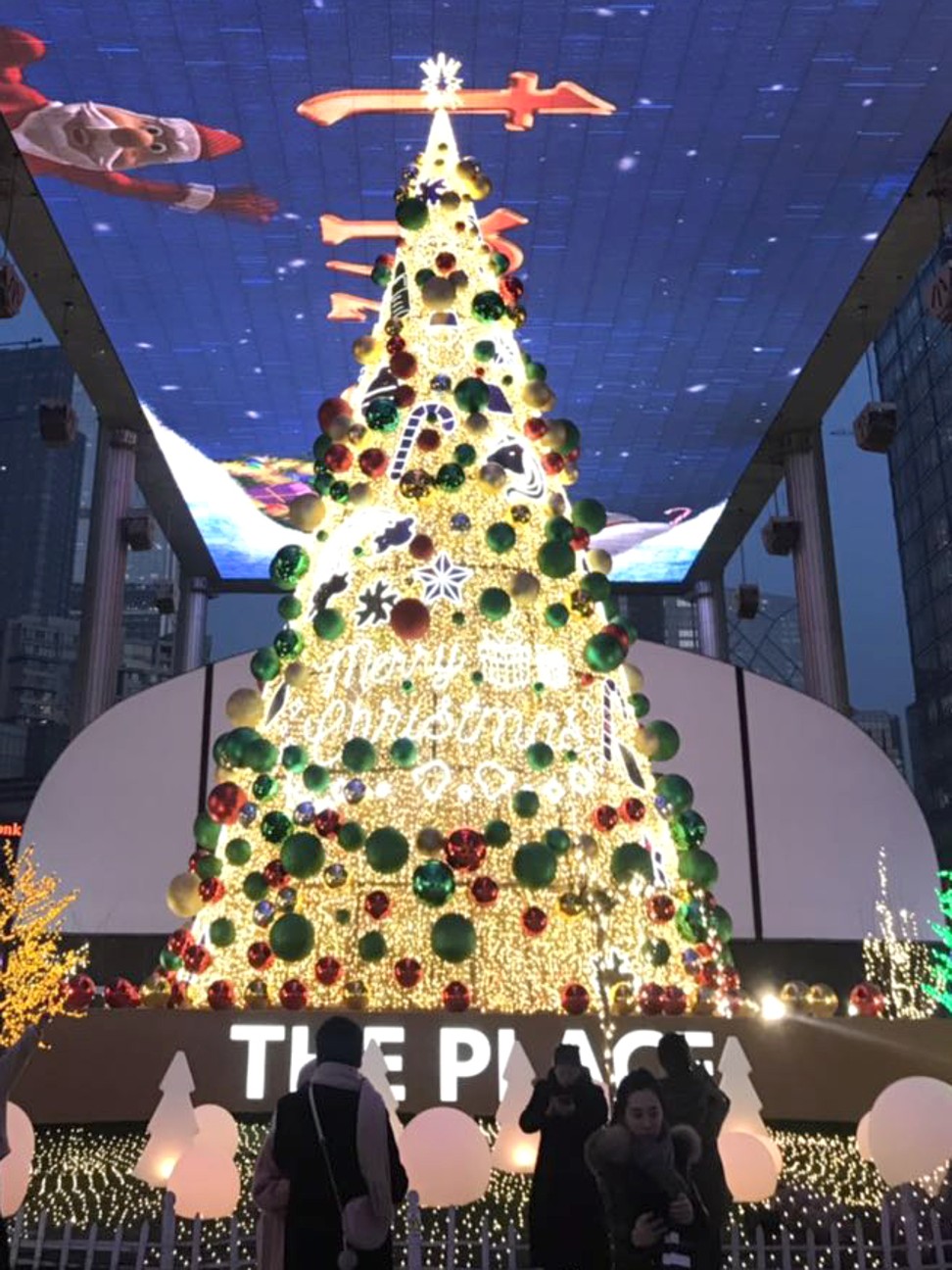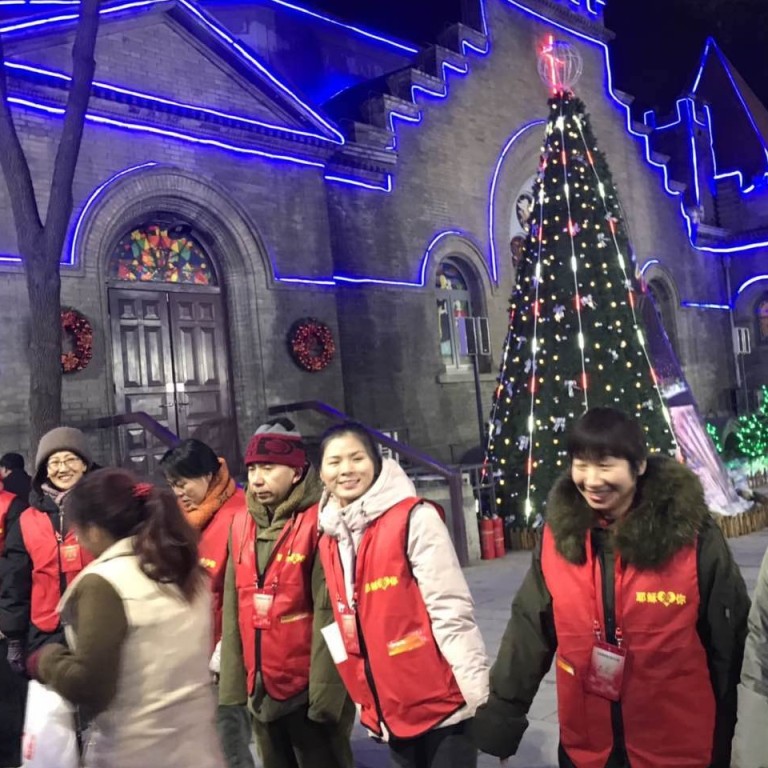
Christmas celebrations in full swing in Beijing despite China’s festive crackdown
- Christmas celebrations still can be found in Beijing – with either a religious or commercial tone – while some other Chinese cities are banning them
- Communist Party stresses ‘traditional Chinese values and cultures’ amid a tide of nationalism stoked by the country’s trade war with the US
The familiar trappings of Christmas were gone from some Chinese cities, but at a shopping centre in central Beijing, the popular English Christmas carol that six-year-old Sisi sang with her kindergarten classmates made the season bright in the nation’s capital.
“We wish you a merry Christmas …” the little girl sang.
“We all learn English and we all can sing this song,” she said proudly, shaking her head to show off her reindeer antler hair band.
Christmas in China 2018 is less cheerful and bustling than in other years, as the ruling Communist Party stresses “traditional Chinese values and cultures” amid a growing tide of cultural nationalism stoked by the country’s trade war with the United States.
Christmas decorations reportedly have been banned in at least four cities this year, including Langfang, about 55km (34 miles) south of Beijing, where shop windows were stripped of Christmas stickers and streets were kept free of Christmas banners and lights.
The seasonal humbug follows similar outbreaks of anti-Christmas rhetoric in 2014 and 2017. It appears not to be centrally organised, but rather a spreading resistance to foreign festivals by local authorities seeking to align themselves with a changing outlook in the Chinese government.
The capital itself seems free from such bans, though. As a South China Morning Post reporter found, people were continuing to mark Christmas across the sprawling metropolis in ways both commercial and religious, though for the most part Christmas has largely continued to be a shopping festival in Beijing and other cities.
At the shopping centre, where a Christmas sale of Lego toy building bricks was under way, kindergarten crooners Sisi and friends eyed Lego items they said they coveted as Christmas gifts.
Throughout the mall, lights and decorations formed “sale” signs. Santa Clauses waved banners to promote big discounts on a multitude of merchandise.
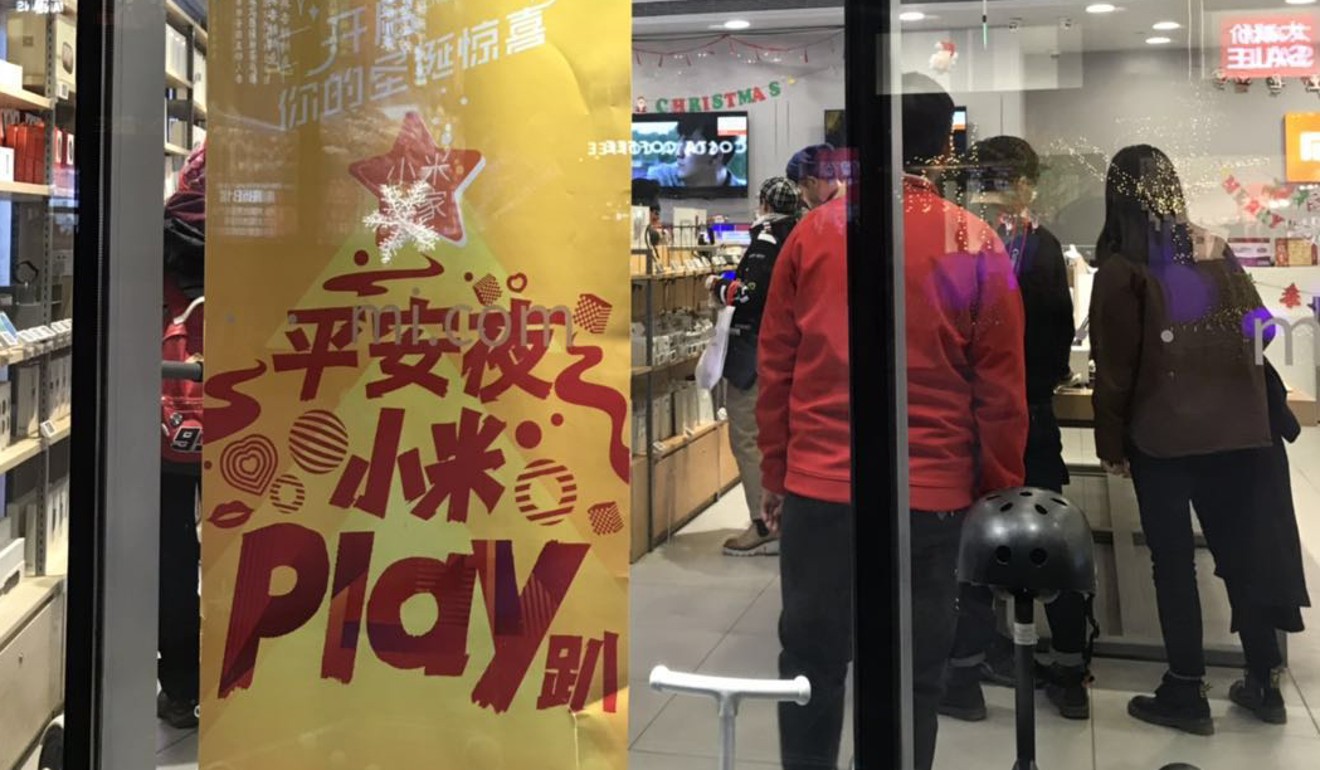
There were even “folk customs” that appeared newly invented, such as giving an apple as a gift – which perhaps was merely part of a marketing campaign by China’s fruit dealers.
A cake boutique featured several sample cakes shaped as Christmas trees. The boutique – next to a genuine Christmas tree – was selling the cakes for 498 yuan to 5,000 yuan (US$72 to US$724), depending on the size.
“We’ve got quite some orders, mostly from companies,” a clerk said. “They wanted a good atmosphere till the end of year. Some [buyers] have already taken their cakes away and some will come tomorrow [December 25]. That’s the real Christmas Day.”
A much larger Christmas tree – more than 10 metres (32 feet) tall – has been up for a few days at the Place, a Beijing shopping centre. It will remain there until the new year.
“It’s beautiful and festive. It makes us happy,” said Jin Cui, a mother who was taking selfies with her four-year-old daughter in front of the tree. An overhead LED screen – said to be the biggest in Asia – showed Santa Claus cartoons to joyful music.
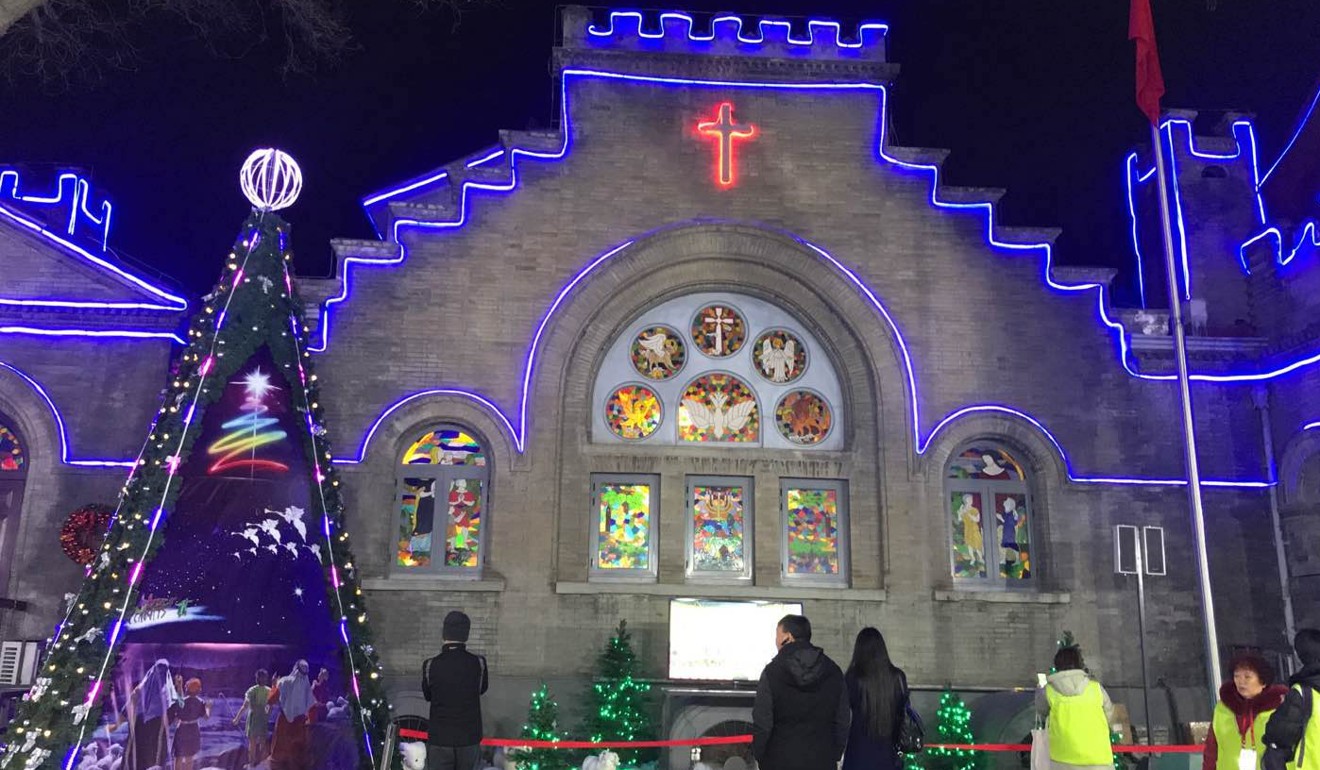
Christmas trees, however, were not ubiquitous amid the celebrations. A tree was conspicuously absent at the U-Town Mall, since it had one last year.
“I don’t know why we don’t have a big tree this year, but I wish we did,” said a staff member who declined to be named. “Why not let people celebrate? You can’t check on everybody and ban them.”
While Christmas continued to be a shopping festival in Beijing, assorted ceremonies and services acknowledged the religious origins of Christmas.
On Christmas Eve, volunteers of the Asbury Church, the oldest Protestant church in the Chinese capital, people in yellow vests stood in two queues on a street in central east Beijing near the fast-growing commercial district of Chongwenmen. Here in the heart of historic Beijing they handed out fliers to passers-by – watched by uniformed policemen in vehicles nearby.
“Merry Christmas. Jesus loves you,” the volunteers said.
Outside the church entrance, nearly 100 people stood in line for the start of the night’s second concert of Christmas carols. As they waited, they watched a big screen that showed the choir singing inside.
In front of the building stood a Christmas tree. Not far away flew a Chinese flag.
“Christmas Eve is the big night for our Christians. I come here every year,” said Joseph Li, a local businessman who was baptised 10 years ago. Although the church was full and the line of people waiting to get in was long, Li said he had seen even bigger Christmas Eve gatherings in other years.
“Maybe because it’s a workday, not a weekend,” he said.
Meanwhile, celebrating Christmas religiously was more challenging for Christians from China’s “underground” churches who have been hit by a broad crackdown on unofficial places of worship.
Early this year, amendments to China’s Religious Affairs Regulation gave grass-roots officials more power to act against churches and impose tougher penalties for “unauthorised religious gatherings”.
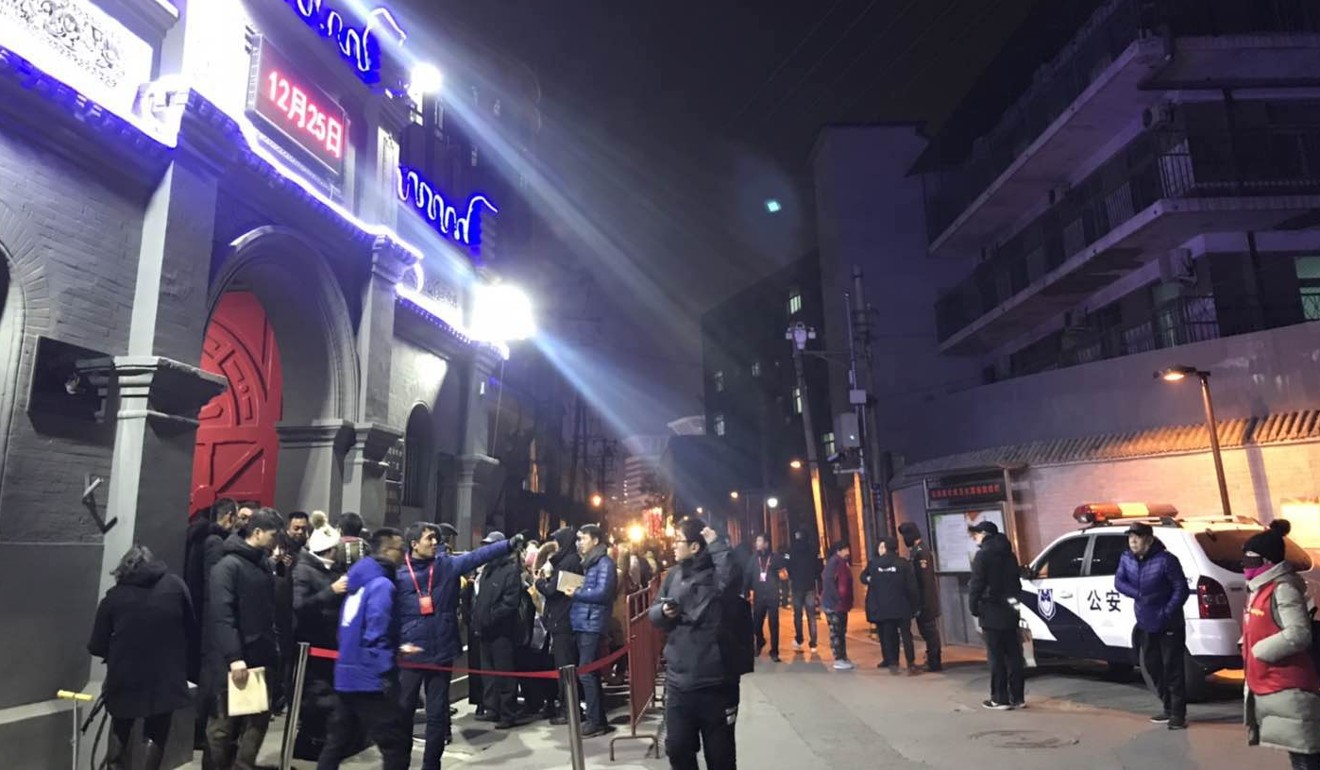
Many worshippers have to celebrate Christmas in their homes or in small groups as they are not allowed to hold big public gatherings.
A member of Shouwang, a Beijing Christian group that operated one of the capital’s biggest underground churches before a government crackdown in 2011, said their church founder Reverend Jin Tianming remains under house arrest. At its height, the group boasted about 1,000 mainly middle class members.
“There is no premise and it is impossible to have large gatherings,” the worshipper said. “All we can do is to get together and celebrate Christmas in small groups.”
Additional reporting by Josephine Ma


